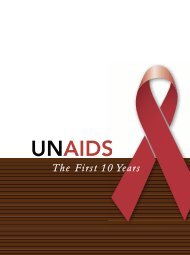Task Shifting - Global Recommendations and Guidelines - unaids
Task Shifting - Global Recommendations and Guidelines - unaids
Task Shifting - Global Recommendations and Guidelines - unaids
You also want an ePaper? Increase the reach of your titles
YUMPU automatically turns print PDFs into web optimized ePapers that Google loves.
ackground<br />
The plan is an important component of WHO’s overall efforts to strengthen human resources for<br />
health <strong>and</strong> to promote comprehensive national strategies for developing human resources across<br />
different disease programmes. It is also part of WHO’s efforts to promote universal access to HIV<br />
services.<br />
“Treat” includes a package of HIV treatment, prevention, care <strong>and</strong> support services for health<br />
workers who may be infected or affected by HIV <strong>and</strong> AIDS. “Retain” involves strategies to enable<br />
health systems to retain workers, including through financial <strong>and</strong> other incentives, occupational<br />
health <strong>and</strong> safety <strong>and</strong> other measures to improve the workplace, as well as initiatives to reduce<br />
the migration of health workers.<br />
“Train” includes exploring measures to raise recruitment rates <strong>and</strong> exp<strong>and</strong> pre-service <strong>and</strong> inservice<br />
training. However, it takes six years to train a new doctor <strong>and</strong> three or four to train a nurse.<br />
Waiting for enough new health workers to graduate through the conventional systems will mean<br />
lengthy delays in the provision of urgently needed HIV services. Alongside strategies to increase<br />
the numbers of well-qualified health workers in the system, countries also need to make more<br />
efficient use of the human resources currently available <strong>and</strong> find ways to exp<strong>and</strong> the total health<br />
workforce fast enough to respond to the HIV epidemic. Therefore, “Train” also explores the<br />
potential for increases in efficiency <strong>and</strong> a rapid expansion of the pool of human resources for<br />
health through task shifting.<br />
<strong>Task</strong> shifting: the rational redistribution of tasks among health workforce teams<br />
<strong>Task</strong> shifting is the name now given to a process whereby specific tasks are moved, where<br />
appropriate, to health workers with shorter training <strong>and</strong> fewer qualifications. By reorganizing the<br />
workforce in this way, task shifting can make more efficient use of existing human resources <strong>and</strong><br />
ease bottlenecks in service delivery. Where further additional human resources are needed, task<br />
shifting may also involve the delegation of some clearly delineated tasks to newly created cadres<br />
of health workers who receive specific, competency-based training.<br />
<strong>Task</strong> shifting is not new. There are many examples of this type of delegation for delivering a range<br />
of health services, including those for HIV 4 . In a number of high-income countries, such as<br />
Australia, the United Kingdom of Great Britain <strong>and</strong> Northern Irel<strong>and</strong> <strong>and</strong> the United States of<br />
America, the role of nurses has been extended in some settings to include the prescription of<br />
routine medication, <strong>and</strong> people living with HIV/AIDS have been empowered to participate in the<br />
management of their own chronic condition <strong>and</strong> to support others as part of expert patient<br />
programmes 4-9 . <strong>Task</strong> shifting of various kinds is also currently being implemented in some<br />
resource-constrained countries as a response to acute shortages of human resources for health<br />
<strong>and</strong> particularly amid generalized HIV epidemics. In Malawi <strong>and</strong> Ug<strong>and</strong>a, the basic care package<br />
for people living with HIV/AIDS has been designed to be delivered by non-specialist doctors or<br />
nurses supported by community health workers <strong>and</strong> people living with HIV/AIDS. Similarly,<br />
Ethiopia has implemented a plan to hire community health workers to exp<strong>and</strong> the current<br />
workforce delivering HIV services. In other countries, there are examples of task shifting being<br />
implemented in pilot projects, often with the involvement of nongovernmental organizations Annex a .<br />
The WHO global recommendations <strong>and</strong> guidelines<br />
The WHO global recommendations <strong>and</strong> guidelines on task shifting have been developed to<br />
provide an authoritative framework that can help support <strong>and</strong> guide widespread implementation<br />
in those countries that choose to adopt the approach as a national strategy for organizing the<br />
health workforce. They aim to bring clarity to the task shifting experience <strong>and</strong> to identify <strong>and</strong>

















